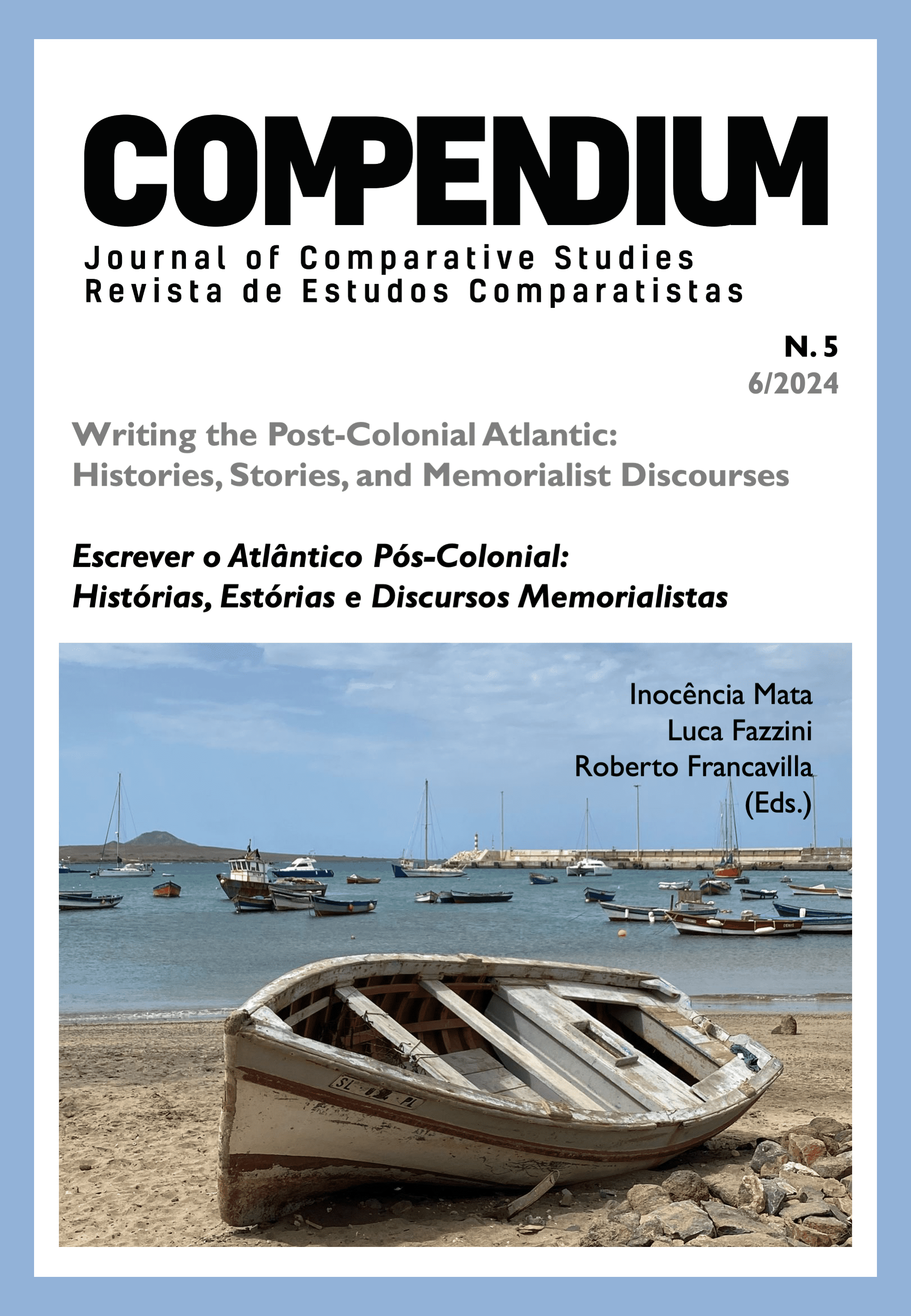Remembrance, Commemorations and Apologies
The Dutch Context and Implications for Other European Nations
DOI:
https://doi.org/10.51427/com.jcs.2024.05.0003Palavras-chave:
escravatura no Atlântico, comércio transatlântico holandês, Europa negra, comemoraçõesResumo
Visto pela lente da história pública como um canal entre a academia (que inclui investigação, conhecimento e ensino superior) e a sociedade em geral (que engloba os meios de comunicação social, as instituições educativas, os museus e o discurso político), o estudo do envolvimento dos Países Baixos no sistema Atlântico de escravatura surge como um terreno profundamente controverso. No cerne desta afirmação está a dura realidade de que, apesar do seu papel fulcral no tecido histórico do Estado e da identidade holandeses, a escravatura foi, durante muito tempo, relegada para a periferia da investigação académica e das narrativas históricas públicas. Basta analisar um ponto focal crítico: a natureza e a disseminação do conhecimento no meio académico, e a sua subsequente transmissão à esfera pública. Apesar da marginalização persistente, a crescente pressão pública exercida nos últimos tempos por vários segmentos da sociedade holandesa levou a uma reavaliação e a uma revisitação da escravatura e das suas persistentes repercussões. Embora estes desenvolvimentos sejam, de facto, neerlandeses, a sua ressonância estende-se para além das fronteiras nacionais, repercutindo-se em interlocutores de toda a Europa, pois a escravatura transcendeu os limites dos Países Baixos, constituindo um dilema europeu mais vasto. Assim, neste artigo falarei, como já referido, das implicações do tráfico transatlântico neerlandês, caracterizado pela colonização, escravização e exploração económica sistémicas, em que várias potências europeias disputavam o domínio.
Downloads
Referências
Beckle, Hilary. 2013. Britain’s Black Debt: Reparations for Caribbean Slavery and Native Genocide. Kingston: University Press of the West Indies.
Cain, Artwell. 2016. “Slavery and Memory in the Netherlands: Who Needs Commemora-tion”. Journal of African Diaspora Archaeology and Heritage 4 (3): 227-42.
Draper, Nicolas. 2007. The Price of Emancipation: Slave-Ownership, Compensation and British Society at the End of Slavery. Cambridge: Cambridge University Press.
Eichstedt, Jennifer L., and Stephen Small. 2002. Representations of Slavery: Race, Ideology and Southern Plantations Museums. Washington: Smithsonian Books.
Essed, Filomena, and Kwame Nimako. 2006. “Designs and (Co)-incidents: Cultures of Scholarship and Public Policy on Immigrants/Minorities in the Netherlands”. Inter-national Journal of Comparative Sociology 47: 281-312.
Jouwe, Nancy. 2023. “Een misdaad tegen de menselijkheid: Nederlands lokale politici en burgemesters”. In Staat & Slavernij: Het Nederlandse Koloniale slavernijverleden en zijn doorwerking, edited by Rose Mary Allen, Easther Captain, Matthias van Rossum and Urwin Vyent, 39-49. Amsterdam: Athenaeum-Polak & Van Gennep.
Hawthorne, Camilla. 2022. Contesting Race and Citizenship. Youth Politics in the Black Mediterranen. New York: Cornell University Press.
Hine, Darlene Clark, Trica Danielle Keaton and Stephen Small, ed. 2009. Black Europe and the African Diaspora. Illinois: University of Illinois Press.
Kamp, Klaas van der. 2013. Tekst verklaring Slavernijverleden – Raad van Kerken.
Nimako, Kwame. 2024. “Multiculturalism vs Multiculturalism in the Dutch Material Real World”. In Our Colonial Inheritance, edited by Wayne Modest and Wendeline Flores, 234-45. Tielt: Lannoo/Wereldmuseum.
Nimako, Kwame. 2023. “Afschaffing Zonder Emancipatie”. In Staat & Slavernij: Het Ne-derlandse Koloniale slavernijverleden en zijn doorwerking, edited by Rose Mary Allen, Easther Captain, Matthias van Rossum and Urwin Vyent, 125-31. Amsterdam: Athenaeum-Polak & Van Gennep.
Nimako, Kwame. 2014. “Location and Social Thought in the Black: A Testimony of Africa-na Intellectual Tradition”. In Postcoloniality-Decoloniality-Black Critique: Joints and Fissures, edited by Sabine Broeck and Carsten Junker, 53-62. Frankfurt: Campus Verlag.
Nimako, Kwame, Amy Abdou and Glenn Willemsen. 2014. “Chattel Slavery and Racism: A Reflection on the Dutch Experience”. In Dutch Racism, edited by Philomena Essed and Isabel Hoving, 31-51. Amsterdam and New York: Brill/Rodopi.
Nimako, Kwame, and Glenn Willemsen. 2011. The Dutch Atlantic: Slavery, Abolition and Emancipation. London: Pluto Press.
Small, Stephen. 2023. In The Shadows of the Big House: Twentieth-First-Century Antebel-lum Slave Cabins & Heritage Tourism in Louisiana. Jackson: UP of Mississippi.
Schalkwijk, Marten, and Stephen Small. 2012. New Perspectives on Slavery and Colonial-ism in the Caribbean. Amrit Publishers.
Small, Stephen. 2020. “Black Expressive Culture in England and Europe”. In Reflections: Cultural Voices of Black British Irrepressible Resilience, edited by Pawlet Brookes, 13-69. Leicester: Serendipity.
Small, Stephen. 2018. 20 Questions and Answers on Black Europe. Hague: Amrit Publish-ers.
Small, Stephen. 1997. “Contextualizing the Black Presence in British Museums: Represen-tations, Resources and Response”. in E. H. Greenhill (ed.), Museums and Multicul-turalism in Britain, Leicester University Press.
Small, Stephen, Kwame Nimako. 2012. “Collective Memory of Slavery in Great Britain and The Netherlands”. In New Perspectives on Slavery and Colonialism in the Caribbean, edited by Marten Schalkwijk and Stephen Small. Hague: Amrit Publishers.
Small, Stephen, Sandew Hira. 2014. 20 Questions and Answers about Dutch Slavery and its Legacy. Hague: Amrit Publishers.
Willemsen, Glenn. 2006. Dagen van gejuich en gejubel: Viering en Herdenking van de Af-schaffing van de Slavernij in Nederland, Suriname en de Nederlandse Antellen. Hague: Amrit/NiNsee.
Downloads
Publicado
Como Citar
Edição
Secção
Licença
Direitos de Autor (c) 2024 Kwame Nimako

Este trabalho encontra-se publicado com a Licença Internacional Creative Commons Atribuição 4.0.
A Compendium oferece acesso aberto integral a todos os números. Os autores mantêm a posse do copyright e concedem à revista o direito de fazer a primeira publicação do seu trabalho nos termos de uma licença Creative Commons Attribution 4.0 International (CC BY 4.0), que permite a terceiros partilharem o trabalho com a condição de atribuição de autoria e de referência à publicação inicial nesta revista.











